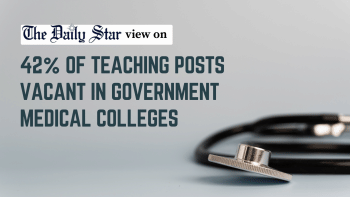OSD 'overdose' is hurting rural patients

The crisis of doctors in rural hospitals and health complexes is a well-known phenomenon, with top government officials including the prime minister often decrying it. The latest to join the bandwagon is the health minister who, on Tuesday, admitted how he was being confronted with questions "everywhere I went". Against this backdrop, a report by Prothom Alo comes as somewhat of a revelation. Citing sources, it says that there are currently 7,459 doctors who have been made OSD—Officers on Special Duty—accounting for 21 percent of all physician posts (35,503) in government facilities. This is one of the main reasons for the perennial doctor crisis.
In other words, the government itself is largely responsible for it. While the rules allow OSD designation of up to 10 percent of officials in approved posts, the health authorities have more than doubled it to the detriment of rural patients who are often forced to seek treatment in Dhaka or elsewhere. The OSD status can be triggered for a number of reasons—it can be to allow leave for training and education purposes; it can be a form of punishment for misconduct. Whatever the reason, those serving as OSDs, or doctors on leave, are liable to regular salaries and benefits despite being absent from work. The question is, can our overwhelmed public health system afford so many OSDs?
Other reasons for the doctor crisis include unauthorised absence and delays in recruitment. Absenteeism has been attributed to doctors' lack of motivation and incentives to work in rural areas as well as lack of enforcement of service rules—both of which the health minister has vowed to address. There is no reliable data on how many doctors are absentees or have a history of disappearing without leave, but the number is feared to be substantial. These "missing" doctors, in government facilities where resources are already overstretched, are doing a great disservice to their patients and the nation at large. But we must not underestimate the role of the authorities in this regard.
The recruitment issue is one that almost all government institutions, not just medical, seem to suffer from. We have previously reported on the acute shortage of nurses and other health professionals in public hospitals. Even government medical colleges are no exception, with 42 percent of teaching posts in 37 such colleges currently lying vacant. The addition of the OSD problem further compounds this crisis. We, therefore, urge the government to take a holistic approach to this issue and do everything necessary to ensure that patients, especially in rural hospitals, are properly served.


 For all latest news, follow The Daily Star's Google News channel.
For all latest news, follow The Daily Star's Google News channel. 









Comments